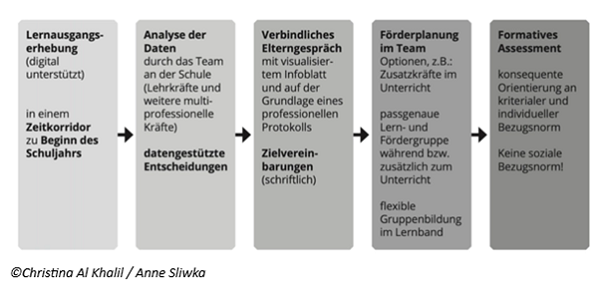Alternative assessment practices for diverse learners

Alternative assessments are designed so that the content of the assessment matches the content of the teaching, and can include open-ended questions, feedback, self-assessment, written compositions, oral presentations, projects, experiments and portfolios of pupil work.
Formative and summative assessment
Different visions of assessment exist; educational literature often refers to two forms of assessment:
- Formative assessment, which is ongoing during learning and can be personalised to the pupil’s capabilities and needs,
- Summative assessment, which occurs at the end of a learning process and compares the pupil to a set of general standards to define outcomes.
From policy experimentation to practice with Erasmus+ projects
Secondary school teachers spend time on assessment practices, but often use them for summative rather than formative purposes. The Promoting Formative Assessment project argues for an evidence-based and theory-driven approach to national policies on assessment. Based on the evidence they gathered, the project developed reusable resources and guidelines on how to use assessment for formative reasons.
The Assess@Learning project addressed assessment and its fitness for purpose in modern digital education systems, competence-based curricula and pedagogies built around enquiry and collaboration. It developed and tested a systemic digital formative assessment (DFA) toolkit on the adoption of DFA practices in schools, and sought to better understand the social impact of DFA on pupils. Involving pupils in the project constitutes a unique part of the policy experimentation.
Assessment for diverse learners and transversal skills
Many educators implement the same routines for all and struggle to adapt their practices to the needs of diverse learners. The Erasmus+ Adaptive Expertise project tackled this outdated form of teaching to support schools, teams and teachers in becoming adaptive experts and developing a policy on adaptive expertise (AE). The project produced an inspirational guide and an online course about acquiring AE through formative assessment.
The Erasmus+ project Futureskills21 supports pupils in acquiring and developing key competences to foster future employability and socio-educational and professional development. It produced Track and Teach, an assessment toolbox for 21st-century competences.
Inclusion and well-being through assessment
Transversal competences, including social and emotional learning, are increasingly considered as key 21st-century skills. These require new assessment methods. The Erasmus+ funded Learning to be project developed a toolkit, a range of resources such as self-assessment tools and policy recommendations for developing social and emotional competences in general education schools. Most materials are available in English, Italian, Spanish, Latvian and Lithuanian.
In Germany, an assessment method called the Kernroutine (core routine) was developed based on international best practice approaches, in particular from a Canadian practice model for the promotion of literacy and numeracy, combining systematic digital learning diagnostics with targeted interventions:
- Assess the learning baseline
- Analyse the data
- Prioritise parental involvement
- Plan supportive measures
- Formative assessment
The study concludes that if the core routine is implemented, the likelihood that all pupils can achieve the competences needed to engage with the societies in which they live increases significantly.
Integrated assessment in VET
Evaluation and feedback systems in vocational education and training (VET) too often focus only on achieving a standard, not on learning. Therefore, the Erasmus+-funded Meten is Weten project’s intention was to adapt and optimise this Belgian VET institution’s way of evaluating and giving feedback. This would be achieved by making its evaluation more digital, and by registering all evaluations and feedback (formative and summative) in a single integrated system.
It analysed usual assessment practices, using the ratio of formative to summative assessment and the time needed for an overview of the student’s learning path. Following this, participants innovated new models of evaluation and feedback based on their experiences.
Additional information
-
Evidence:N/A
-
Funding source:European Commission
-
Intervention level:N/A
-
Intervention intensity:N/A
-
Participating countries:BelgiumCanadaCyprusEstoniaFinlandFranceGermanyGreeceIrelandItalyLiechtensteinLuxembourgNetherlandsNorwayPortugalSlovakiaSpainUnited Kingdom
-
Target audience:Government staff / policy makerHead Teacher / PrincipalResearcherStudent TeacherTeacherTeacher Educator
-
Target audience ISCED:Primary education (ISCED 1)Lower secondary education (ISCED 2)Upper secondary education (ISCED 3)

